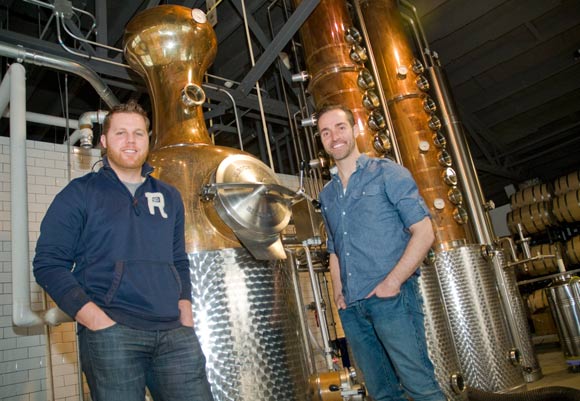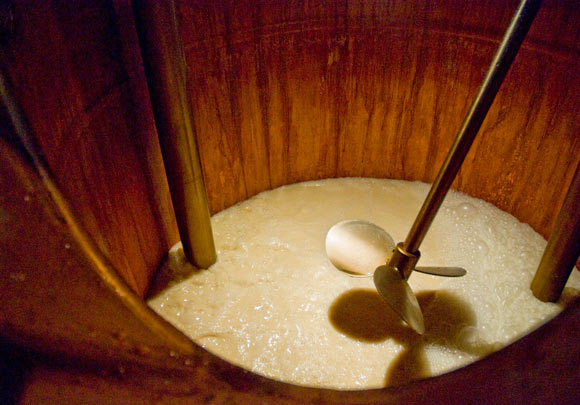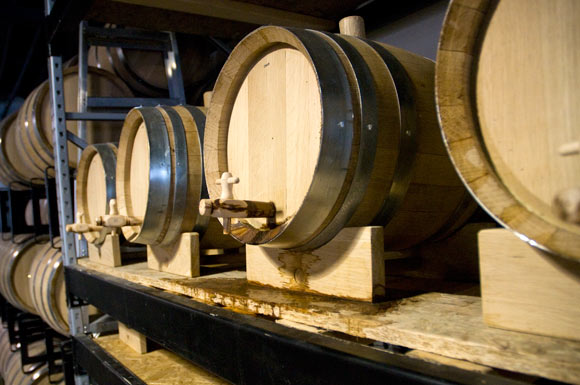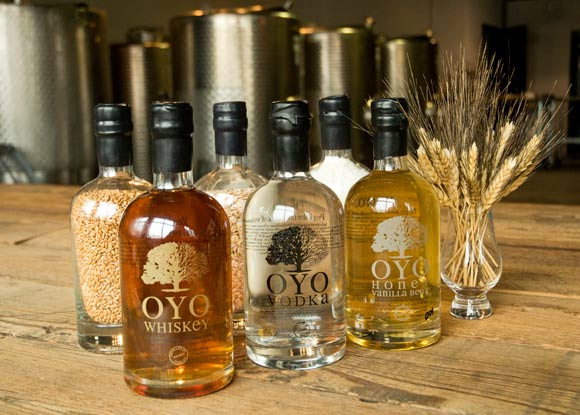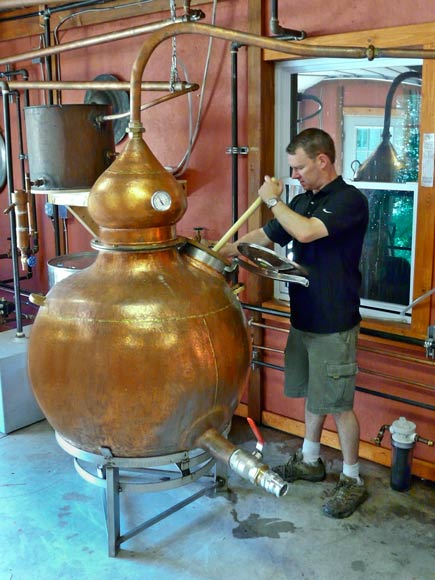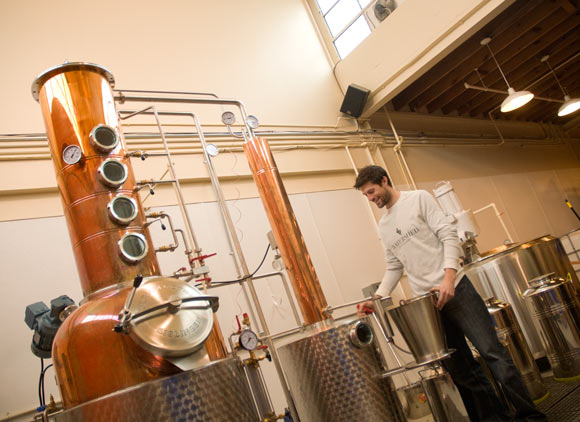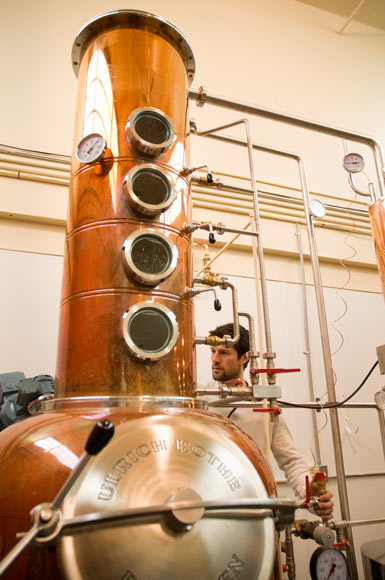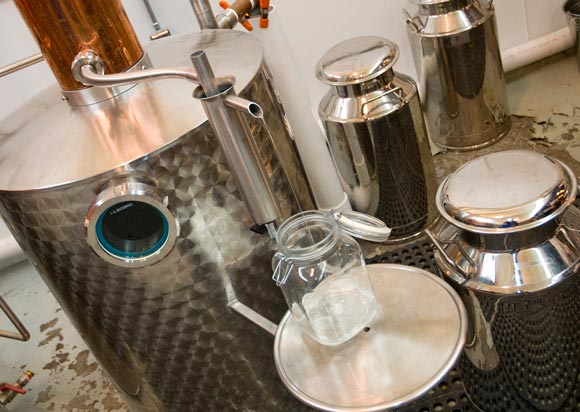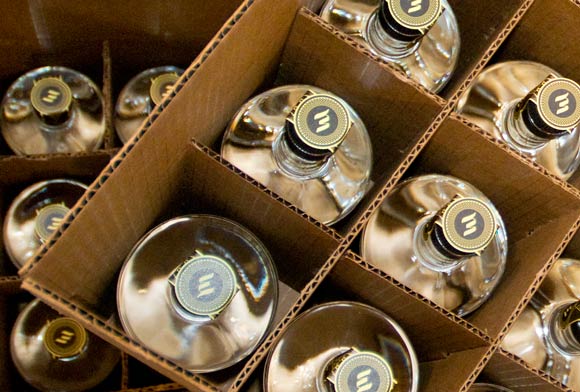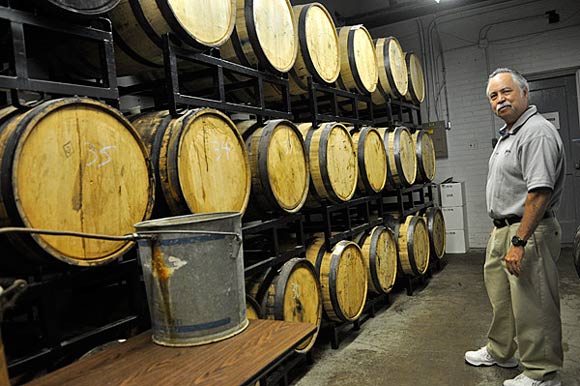craft distillers make snazzy start-ups, but ohio laws are none-too-friendly
They say everything old is new again, and when it comes to distilling in Ohio, that is particularly true.
There was a time when this great state overflowed with distilleries that converted local corn and grain into whisky, which wended its way in barrels down the mighty Ohio and Mississippi rivers -- all the way down to New Orleans. Over time, every last one of those distilleries dried up, leaving the state with nary a drop of locally produced hooch.
Until recently, that is.
When Sam McNulty opens his Ohio City-based Market Garden Brewery later this year, he will join four other micro-distilleries scattered about the state. Cincinnati's Woodstone Creek is the oldest, followed by Columbus' Middle West Spirits, Grandview's Watershed Distillery, and Tom's Foolery in rural Geauga County. Others, too, are waiting in the wings, perfecting their recipes in hopes of joining this growing trend of artisan spirit producers.
"Although the craft distilling trend is new, in an old state like Ohio, there exists a very strong distilling history," explains Don Outterson, owner of Woodstone Creek. "In the days before refrigeration, it was very practical to render perishable products like corn into products with an infinite shelf life like whisky."
It is largely thanks to Outterson that any small distilleries exist in Ohio. When he first approached state liquor officials -- way back in 1998 -- to add distilled products to his small Cincinnati winery, Outterson ran into a brick wall. "There had been no distilleries in the state for so long that nobody knew what to do," he adds. As a CPA and a longtime brewery consultant, Outterson himself was relied upon for assistance in drafting more modern legislative rules.
Going hand-in-hand with the local foods movement, and following on the heels of the craft beer renaissance, the artisan distilling trend seemed destined to happen, both nationally and locally. Blessed with abundant crops, fresh water and a food-savvy populace evermore focused on quality, Ohio was ripe for the picking.
In Northeast Ohio, Tom Herbruck decided to focus his attention on fruit -- Ohio-grown apples to be precise. To craft his applejack, a fine brandy produced in this country for over 300 years, Herbruck starts with fresh apple cider. The juice is first fermented, turning it from sweet to hard cider. The hard cider is then distilled in a copper potstill, extracting the alcohol and concentrating the flavors. Rested in charred oak barrels for up to two years, the brandy ages, mellows and takes on a golden hue.
"Terroir is a real thing," explains Herbruck. "The apples that grow in the Western Reserve area of Ohio taste different from the apples that grow in Northern France." Everything affects the final product, he adds, from the varieties of apples used to the kind of soil in the orchard. "It all matters."
Realizing that the timing and conditions were ideal in Central Ohio for a new micro-distillery, Brady Konya and Ryan Lang launched Middle West Spirits in Columbus. Located a block off High Street in the Short North, Middle West is producing a true grain-to-glass vodka called Oyo (pronounced oh-WHY-oh), the Native American word for the Ohio River Valley. Unlike most vodka, where every effort is made to strip flavor from the spirit, Oyo retains a rich vegetal character. Middle West sells its vodka at its Columbus shop and in area liquor stores.
"Railcars full of corn and wheat roll out of this state every day," says Lang. "Our spirits are made using 100 percent Ohio grains like corn, rye and soft red winter wheat."
When Market Garden Brewery opens later this year in Cleveland, owner Sam McNulty will have a secret weapon in the micro-spirits battle: brewmaster Andy Tveekrem. For the last five years, Tveekrem has served as head brewer for well-regarded Dogfish Head Brewery, so he certainly knows beer. That skill, explains McNulty, translates directly into distilling.
"The hardest part of the distilling process is making the beer," notes McNulty. "Before you can distill, you have to mash and ferment the grains just like you do when making beer." In addition to Tveekrem's world-famous brews, Market offerings will include small-batch gin, vodka, and white (unaged) whisky.
Fetching just shy of $100 for his fine aged bourbon, Don Outterson obviously is doing something right. His high-end spirits, crafted in Southwestern Ohio from local products, have caught the attention of those with discerning palates. "You don't have to be in Kentucky to make great whisky," Outterson is fond of saying. "When you taste a really good spirit, something wonderful is going on. It can become religion. My products are not for people who like to do shots."
For shallower pockets, Woodstone Creek also produces flavorful vodka made from 100 percent Ohio corn.
Despite his own success, Outterson wishes the state would make it easier for others to join him. All across the country, entrepreneurs are scrambling to open craft micro-distilleries -- new-economy operations that produce local agricultural products using local agricultural products. Sadly, Ohio, a state rich with entrepreneurship and agricultural resources, makes it nearly impossible for additional operations to succeed here.
"For the most part, Ohio is not open for business when it comes to distilling," Outterson says. "Until the laws are changed I actually try and discourage people from entering the market."
As it stands, only one permit is allowed in each of Cuyahoga, Franklin and Hamilton counties, a direct concession made to Paramount Distilleries, a large Cleveland manufacturer of bottom-shelf hooch. Other restrictive distilling permits are available, but they don't allow the kinds of on-site sales and tastings that make micro-breweries and wineries economically viable. The outcome of the legislation is that it encourages would-be distillers to set up shop in more progressive states.
"The larger distilleries don't like these smaller distilleries," admits State Senator Bill Seitz. "Every bottle that Don Outterson sells is one less bottle that Paramount sells."
A no-nonsense representative of Cincinnati's Hamilton County, it was Seitz who helped Outterson get new legislation passed in the first place. And as far as he's concerned, the legislation does not go far enough.
"People understand that we want to promote tourism," he says. "What kind of tourism can we have when these micro-distilleries can't even sell the products they make? Given the current budget shortfall, we ought to be thinking of ways to drum up additional tourism dollars in Ohio. The folks in Kentucky did this and by god the world didn't end."
The Kentucky Bourbon Trail, to which the State Senator is referring, is a string of tourism-friendly distilleries that contributes approximately $1 billion of economic benefit to that state each year.
As the owner of Ohio's newest sanctioned craft distillery, Greg Lehman knows all too well of the current legislation's shortcomings. Located in the Grandview neighborhood near Columbus, Watershed Distillery sold its first bottle of vodka this past December. But they didn't sell it on premises.
"We can sell T-shirts and tours of the distillery," says Lehman. "But unfortunately, visitors have to go down the street to the state liquor store to buy a bottle. Would we love it if folks could buy a bottle on their way out the door? You bet we would. But you have to play by the rules."


